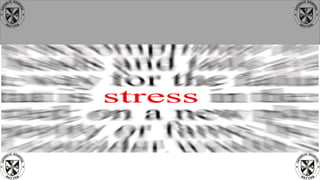STRESS & ITS MANAGEMENT AT BATTTOR HOSPITAL.pptx
- 1. STRESS & STRESS MANAGEMENT
- 3. STRESS: WHAT IS IT? Although we all talk about stress, it often isn’t clear what stress is really about. Many people consider stress to be something that happens to them, as a negative event such as an injury or a job loss. Others think that stress is what happens to our body, mind, and behavior in response to an event (E.g. heart thumping, anxiety, or nail biting).
- 4. STRESS & STRESSOR • Stress : A person’s response to events that are threatening or challenging. • Stress is a reaction, (both physical and psychological) to circumstances that are perceived to be negative and threatening to the individual. • Stress occurs when the demands from the environment challenges an individual’s adaptive capacity or ability to cope (Cohen, Kessler & Gordon, 1995).
- 5. STRESS & STRESSOR We all need some amount of stress to help us adapt to change and motivate us to achieve our goals, nonetheless high levels of stress will interfere with our daily functioning. Stressor : A stimulus that causes stress OR The situations that provoke such a response
- 6. STRESSOR Stressors can affect a person in one of two ways: Physiologically: affecting body functioning such as heart rate, blood pressure, hormonal changes etc. Psychologically: sensitivity changes in cognitive and emotional functioning such as fear, anger, anxiety etc
- 7. STRESSOR “Its not stress that kills us, it is our reaction to it.” (Hans Selye)
- 9. 3 TYPES OF STRESS Eustress: A good stress; motivating or inspiring. E.g winning bet/ lottery, getting married, getting job etc Nuestress: Nuetral stress; any information perceived to be inconsequential Distress: Bad stress; information perceived to threatening. E.g death of loved one, chronic disease, etc
- 10. TYPES OF DISTRESS Acute Stress Acute stress is usually for short time and may be due to work pressure, minor accident, over exertion, searching something but you misplaced it. Chronic Stress This type of stress is the most serious type. Chronic stress is a prolonged stress that exists for weeks, months, or even years. Usually due to poverty, broken families and marriages, chronic illness and successive failures in life.
- 11. CAUSES OF STRESS AT HOME Death of spouse, family, near relative or friend. Injury or illness of any family member. Separation or divorce from partner. Pregnancy or birth of a new baby. Children's behavior or disobedience. Children's educational performance. Not sufficient money to raise your standard of living. Children with special needs
- 12. PROBABLE SYMPTOMS &SIGNS Insomnia Loss of mental concentration Depression Loss of appetite/excessive eating Extreme anger and frustration Family conflict Migraine, Headaches and back problems Palpitation
- 13. PROBABLE SYMPTOMS &SIGNS CON’T Fatigue Emptiness Doubt about one’s skills Feeling of rejection Mood swings Irritability Constant worrying Seeing only the negatives
- 14. GENERALADAPTATION MODELS A theory developed by Selye that suggests that a person’s response to a stressor consists of three stages: alarm and mobilization, resistance, and exhaustion Stage I – Alarm & Mobilization: The “fight or flight” response which causes you to be ready for physical activity.
- 15. GENERALADAPTATION MODELS Stage II – Resistance: If stress continues, the body adapts to the stressors it is being exposed to and tries restoring spent energy and repairing damage Stage III – Exhaustion: Stress continues to exist for a long time and the body’s resources get depleted or exhausted.
- 18. COPING WITH STRESS Efforts to control, reduce, or learn to tolerate the threats that lead to stress are known as coping. We habitually use certain coping responses to deal with stress.
- 19. COPING WITH STRESS Efforts to control, reduce, or learn to tolerate the threats that lead to stress are known as coping. We habitually use certain coping responses to deal with stress.
- 20. STEPS TO MANAGING STRESS step 1: Identify if your are stressed
- 21. STEPS TO MANAGING STRESS Step 2: Identify the stressor
- 22. STEPS TO MANAGING STRESS Step 3: Identify the reason for the stressor.
- 23. STEPS TO MANAGING STRESS Step 4: Select an appropriate stress
- 24. STEPS TO MANAGING STRESS Step 5: Evaluate.
- 25. RELIEF FROM STRESS • Stop shallow breathing
- 26. RELIEF FROM STRESS • Create the habit of deep breaths
- 27. RELIEF FROM STRESS • Visualize and communicate your vision
- 28. RELIEF FROM STRESS • Laugh 1.Crack some jokes. 2.Do your goofiest impression. 3.Tickle a child that you love
- 29. RELIEF FROM STRESS • Be aware of your choices; you always have a choice
- 30. RELIEF FROM STRESS • Learn to say no; you cannot do everything you are asked.
- 31. RELIEF FROM STRESS • Be thankful
- 32. RELIEF FROM STRESS Do nothing. That's right, folks, do nothing at all. Close the door, open the window, have a seat, and take a little break from life. If your mind is racing, learn to meditate and just let that stress go
- 33. RELIEF FROM STRESS Listen to music
- 34. ABC STRATEGY A = Awareness B = Balance C = Control
- 35. STEPS TO MANAGING STRESS


































